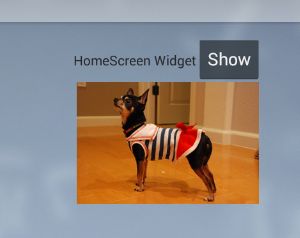Android之AppWidget桌面小部件开发
做需求中遇到AppWidget相关知识,所以学习了官方文档和网上中文材料,并简单学习做了一个相关的Demo。
- Widget了解
- Widget主要组件
- 创建自定义Widget
Widget了解
App Widget是应用程序窗口小部件(Widget)是微型的应用程序视图,它可以被嵌入到其它应用程序中(比如桌面)并接收周期性的更新。你可以通过一个App Widget Provider来发布一个Widget
Widget组成
AppWidgetProviderInfo
描述一个App Widget元数据,比如App Widget的布局,更新频率,这个应该在XML里定义AppWidgetProvider
Android中提供的用于实现桌面小工具的类,其本质是一个广播,即BroadcastReceiver,用它来管理widget接收到广播后做出对应的响应处理widget_layout
用来设置widget的相关布局,但是Widget并不支持所有的布局和控件,这点需要注意。
创建一个Widget
建立一个Widget示例,要求Widget能被添加到主屏中,widget包含3个成分:文本、按钮和图片。文本要求:显示提示信息;按钮要求:点击按钮,弹出一个Toast提示框;图片要求:每个5秒随机更新一张图片
1.在修改Manifest中配置,在Manifest中注册AppWidgetProvider和负责发送更新图片广播的Service
<application
android:allowBackup="true"
android:icon="@drawable/ic_launcher"
android:label="@string/app_name"
android:theme="@style/AppTheme" >
<receiver android:name=".ExampleAppWidgetProvider" >
<intent-filter>
<action android:name="android.appwidget.action.APPWIDGET_UPDATE" />
<action android:name="com.leeds.widget.UPDATE_ALL"/>
intent-filter>
<meta-data android:name="android.appwidget.provider"
android:resource="@xml/example_appwidget_info" />
receiver>
<service android:name=".ExampleAppWidgetService" >
<intent-filter>
<action android:name="android.appwidget.action.EXAMPLE_APP_WIDGET_SERVICE" />
intent-filter>
service>
application>android.appwidget.action.APPWIDGET_UPDATE,必须要显示声明的action!因为所有的widget的广播都是通过它来发送的;要接收widget的添加、删除等广播,就必须包含它。
com.leeds.widget.UPDATE_ALL,是自定义的action,是为了接收服务所发送的更新图片的广播。
ExampleAppWidgetService 是用于更新widget中的图片的服务。
android.appwidget.action.EXAMPLE_APP_WIDGET_SERVICE 用于启动服务的action
2.编辑AppWidgetProviderInfo对应的资源文件
<appwidget-provider xmlns:android="http://schemas.android.com/apk/res/android"
android:minWidth="180dp"
android:minHeight="180dp"
android:previewImage="@mipmap/ic_note"
android:initialLayout="@layout/activity_main"
android:resizeMode="horizontal|vertical"
android:widgetCategory="home_screen">
appwidget-provider>文件中各个属性意义如下
minWidth 和minHeight
它们指定了App Widget布局需要的最小区域。缺省的App Widgets所在窗口的桌面位置基于有确定高度和宽度的单元网格(cell)中。如果App Widget的最小长度或宽度和这些网格单元的尺寸不匹配,那么这个App Widget将上舍入(上舍入即取比该值大的最接近的整数——译者注)到最接近的单元尺寸。
注意:app widget的最小尺寸,不建议比 “4x4” 个单元格要大,基于适配性考虑

minResizeWidth 和 minResizeHeight
它们属性指定了 widget 的最小绝对尺寸。也就是说,如果 widget 小于该尺寸,便会因为变得模糊、看不清或不可用。 使用这两个属性,可以允许用户重新调整 widget 的大小,使 widget 的大小可以小于 minWidth 和 minHeight。
Tip:
当 minResizeWidth 的值比 minWidth 大时,minResizeWidth 无效;当 resizeMode 的取值不包括 horizontal 时,minResizeWidth 无效。minResizeHeight对应同理。updatePeriodMillis
它定义了 widget 的更新频率。实际的更新时机不一定是精确的按照这个时间发生的。建议更新尽量不要太频繁,最好是低于1小时一次。 或者可以在配置 Activity 里面供用户对更新频率进行配置。 实际上,当updatePeriodMillis的值小于30分钟时,系统会自动将更新频率设为30分钟!这是出于对电池的保护,因为如果当更新时机到达时设备正在休眠,那么就会唤醒设备以执行更新,频繁唤醒对电池寿命有影响。因此当需要较频繁的更新时,可以使用基于alarm的更新来代替widget自身的刷新机制,将 alarm 类型设置为 ELAPSED_REALTIME 或 RTC,将不会唤醒休眠的设备,同时请将 updatePeriodMillis 设为 0。或者使用service,AlarmManager,Timer等方式。
initialLayout
指向 widget 的布局资源文件configure
可选属性,定义了 widget 的配置 Activity。如果定义了该项,那么当 widget 创建时,会自动启动该 Activity。previewImage
指定预览图,该预览图在用户选择 widget 时出现,如果没有提供,则会显示应用的图标。该字段对应在 AndroidManifest.xml 中 receiver 的 android:previewImage 字段。由 Android 3.0 引入。autoAdvanceViewId
指定一个子view ID,表明该子 view 会自动更新。在 Android 3.0 中引入。resizeMode
指定了 widget 的调整尺寸的规则。可取的值有: “horizontal”, “vertical”, “none”。”horizontal”意味着widget可以水平拉伸,“vertical”意味着widget可以竖值拉伸,“none”意味着widget不能拉伸;默认值是”none”。Android 3.1 引入。widgetCategory
指定了 widget 能显示的地方:能否显示在 home Screen 或 lock screen 或 两者都可以。它的取值包括:”home_screen” 和 “keyguard”。Android 4.2 引入。
tip:
只有低于5.0的Android系统可以将widget添加到lock screen,5.0及5.0以上的系统规定widget只有添加到home screen有效。initialKeyguardLayout
指向 widget 位于 lockscreen 中的布局资源文件。Android 4.2 引入。
3.编辑widget的布局文件
<LinearLayout
xmlns:android="http://schemas.android.com/apk/res/android"
android:layout_width="match_parent"
android:layout_height="match_parent"
android:orientation="vertical" >
<LinearLayout
android:layout_width="wrap_content"
android:layout_height="wrap_content"
android:layout_gravity="center"
android:orientation="horizontal" >
<TextView
android:layout_width="wrap_content"
android:layout_height="wrap_content"
android:text="HomeScreen Widget"
android:textColor="#242424"/>
<Button
android:id="@+id/btn_show"
android:layout_width="wrap_content"
android:layout_height="wrap_content"
android:text="Show" />
LinearLayout>
<ImageView
android:id="@+id/iv_show"
android:layout_width="wrap_content"
android:layout_height="wrap_content"
android:layout_gravity="center"/>
LinearLayout>要注意的是widget并不支持所有的布局和控件,而是仅支持Android布局和控件的一个子集。具体支持的布局可以查看官方文档。
4.编辑AppWidgetProvider的实现类
当创建第一个widget到桌面时,执行onEnable,启动发送更新图片广播服务,当删除最后一个widget时,终止该服务;
每添加一个widget调用一次onUpdate,讲对应widget的id添加到widgetSet中;
onReceive()中,处理两个广播:
(1) 更新桌面的widget 以及 响应按钮点击广播。当收到ACTION_UPDATE_ALL广播时,调用updateAllAppWidgets()来更新所有的widget。
(2) 当收到的广播的categery为Intent.CATEGORY_ALTERNATIVE,并且scheme为BUTTON_SHOW时,对应是按钮点击事件。按钮的监听是在updateAllAppWidgets()中注册的。
public class ExampleAppWidgetProvider extends AppWidgetProvider {
private static final String TAG = "ExampleWidgetProvider";
private boolean DEBUG = false;
//启动service服务对应的action
private final Intent EXAMPLE_SERVICE_INTENT = new Intent("android.appwidget.action.EXAMPLE_APP_WIDGET_SERVICE");
//更新widget的广播对应的action
private final String ACTION_UPDATE_ALL = "com.example.user.widgettest.UPDATE_ALL";
//保存widget的id的hashset,每新建一个widget都会为该widget分配一个id
private static Set idsSet = new HashSet<>();
//按钮信息
private static final int BUTTON_SHOW = 1;
//图片数组
private static final int[] ARR_IMAGES = {
R.mipmap.sample_0,
R.mipmap.sample_1,
R.mipmap.sample_2,
R.mipmap.sample_3,
R.mipmap.sample_4,
R.mipmap.sample_5,
R.mipmap.sample_6,
R.mipmap.sample_7,};
@Override
public void onUpdate(Context context, AppWidgetManager appWidgetManager, int[] appWidgetIds) {
// 每次 widget 被创建时,对应的将widget的id添加到set中
for (int appWidgetId : appWidgetIds) {
idsSet.add(Integer.valueOf(appWidgetId));
}
}
@Override
public void onEnabled(Context context) {
// 在第一个 widget 被创建时,开启服务
context.startService(EXAMPLE_SERVICE_INTENT);
super.onEnabled(context);
}
@Override
public void onDisabled(Context context) {
// 在最后一个 widget 被删除时,终止服务
context.stopService(EXAMPLE_SERVICE_INTENT);
super.onDisabled(context);
}
/**
* widget被删除的时候调用
* @param context
* @param appWidgetIds
*/
@Override
public void onDeleted(Context context, int[] appWidgetIds) {
// 当 widget 被删除时,对应的删除set中保存的widget的id
for (int appWidgetId : appWidgetIds) {
idsSet.remove(Integer.valueOf(appWidgetId));
}
}
@Override
public void onAppWidgetOptionsChanged(Context context, AppWidgetManager appWidgetManager, int appWidgetId, Bundle newOptions) {
super.onAppWidgetOptionsChanged(context, appWidgetManager, appWidgetId, newOptions);
}
@Override
public void onReceive(Context context, Intent intent) {
final String action = intent.getAction();
if (ACTION_UPDATE_ALL.equals(action)) {
// “更新”广播
updateAllAppWidgets(context, AppWidgetManager.getInstance(context), idsSet);
} else if (intent.hasCategory(Intent.CATEGORY_ALTERNATIVE)) {
// “按钮点击”广播
Uri data = intent.getData();
int buttonId = Integer.parseInt(data.getSchemeSpecificPart());
if (buttonId == BUTTON_SHOW) {
Toast.makeText(context, "Button Clicked", Toast.LENGTH_SHORT).show();
}
}
super.onReceive(context, intent);
}
private void updateAllAppWidgets(Context context, AppWidgetManager instance, Set idsSet) {
// widget 的id
int appID;
// 迭代器,用于遍历所有保存的widget的id
Iterator it = idsSet.iterator();
while (it.hasNext()) {
appID = ((Integer) it.next()).intValue();
// 随机获取一张图片
int index = (new java.util.Random().nextInt(ARR_IMAGES.length));
if (DEBUG) Log.d(TAG, "onUpdate(): index=" + index);
// 获取 example_appwidget.xml 对应的RemoteViews
RemoteViews remoteView = new RemoteViews(context.getPackageName(), R.layout.activity_main);
// 设置显示图片
remoteView.setImageViewResource(R.id.iv_show, ARR_IMAGES[index]);
// 设置点击按钮对应的PendingIntent:即点击按钮时,发送广播。
remoteView.setOnClickPendingIntent(R.id.btn_show, getPendingIntent(context, BUTTON_SHOW));
// 更新 widget
instance.updateAppWidget(appID, remoteView);
}
}
/**
* 设置点击按钮对应的PendingIntent
* @param context
* @param buttonShowId
* @return
*/
private PendingIntent getPendingIntent(Context context, int buttonShowId) {
Intent intent = new Intent();
intent.setClass(context, ExampleAppWidgetProvider.class);
intent.addCategory(Intent.CATEGORY_ALTERNATIVE);
intent.setData(Uri.parse("custom:" + buttonShowId));
PendingIntent pi = PendingIntent.getBroadcast(context, 0, intent, 0);
return pi;
}
}AppWidgetProvider中的广播处理函数如下:
onUpdate()
当 widget 更新时被执行。同样,当用户首次添加 widget 时,onUpdate() 也会被调用,这样 widget 就能进行必要的设置工作(如果需要的话) 。但是,如果定义了 widget 的 configure属性,那么当用户首次添加 widget 时,onUpdate()不会被调用;之后更新 widget 时,onUpdate才会被调用。
onAppWidgetOptionsChanged()
当widget 被初次添加或者当widget的大小被改变时,执行onAppWidgetOptionsChanged()。你可以在该函数中,根据 widget 的大小来显示/隐藏某些内容。可以通过 getAppWidgetOptions() 来返回 Bundle 对象以读取 widget 的大小信息,Bundle中包括以下信息:
OPTION_APPWIDGET_MIN_WIDTH – 包含 widget 当前宽度的下限,以dp为单位。
OPTION_APPWIDGET_MIN_HEIGHT – 包含 widget 当前高度的下限,以dp为单位。
OPTION_APPWIDGET_MAX_WIDTH – 包含 widget 当前宽度的上限,以dp为单位。
OPTION_APPWIDGET_MAX_HEIGHT – 包含 widget 当前高度的上限,以dp为单位。
onAppWidgetOptionsChanged() 是 Android 4.1 引入的。onDeleted(Context, int[])
当 widget 被删除时被触发。
onEnabled(Context)
当第1个 widget 的实例被创建时触发。也就是说,如果用户对同一个 widget 增加了两次(两个实例),那么onEnabled()只会在第一次增加widget时触发。
onDisabled(Context)
当最后1个 widget 的实例被删除时触发。
onReceive(Context, Intent)
接收到任意广播时触发,并且会在上述的方法之前被调用。
总结:
AppWidgetProvider 继承于 BroadcastReceiver。实际上,App Widge中的onUpdate()、onEnabled()、onDisabled()等方法都是在 onReceive()中调用的,是onReceive()对特定事情的响应函数。
4.编辑发送更新图片广播的Service
public class ExampleAppWidgetService extends Service {
private static final String TAG="ExampleAppWidgetService";
//更新widget的广播对应的action
private final String ACTION_UPDATE_ALL ="com.example.user.widgettest.UPDATE_ALL";
//周期性更新widget的周期
private static final int UPDATE_TIME=5000;
//周期性更新widget的线程
private UpdateThread mUpdateThread;
private Context mContext;
//更新周期的计数
private int count=0;
@Override
public void onCreate() {
// 创建并开启线程UpdateThread
mUpdateThread = new UpdateThread();
mUpdateThread.start();
mContext = this.getApplicationContext();
super.onCreate();
}
@Override
public void onDestroy() {
// 中断线程,即结束线程。
if (mUpdateThread != null) {
mUpdateThread.interrupt();
}
super.onDestroy();
}
@Nullable
@Override
public IBinder onBind(Intent intent) {
return null;
}
/**
* 服务开始时,即调用startService
* @param intent
* @param flags
* @param startId
* @return
*/
@Override
public int onStartCommand(Intent intent, int flags, int startId) {
Log.d(TAG, "onStartCommand");
super.onStartCommand(intent, flags, startId);
return START_STICKY;
}
private class UpdateThread extends Thread{
@Override
public void run() {
super.run();
try {
count=0;
while(true){
Log.d(TAG,"run...count:"+count);
count++;
Intent updateIntent =new Intent(ACTION_UPDATE_ALL);
mContext.sendBroadcast(updateIntent);
Thread.sleep(UPDATE_TIME);
}
} catch (InterruptedException e) {
e.printStackTrace();
}
}
}
}服务UpdateThread 每隔5秒,发送1个广播ACTION_UPDATE_ALL。广播ACTION_UPDATE_ALL在ExampleAppWidgetProvider 被处理:用来更新widget中的图片。
完成后效果:
参考资料
[1] 官方文档
[2] Android 之窗口小部件详解–App Widget
